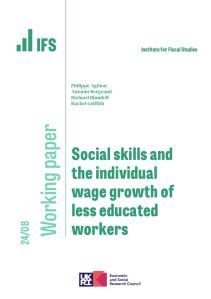A lot of factors influence how much an individual earns. Some of these are determined before you are born: how rich your parents are, as well as your gender and ethnicity. Some are decided very early on in life, such as performance at school. But some of these factors are choices, such as what and where to study at university.
A report by the Institute for Fiscal Studies, published yesterday by the Department for Education, highlights the relative importance of some of these factors in determining graduates’ early career earnings. The results are striking.
Social background is an important determinant of future earnings. Even when comparing students who have similar attainment at school, attend the same institution and study the same subject, those with richer parents earn more. Growing up in the richest fifth of households increases earnings by almost 10 per cent compared to growing up in the poorest fifth, even when all these other characteristics are fixed.
But choices made at age 18 are potentially even more important. Even when comparing students with similar prior attainment and family background, different degrees appear to have a significantly different impact on early career earnings. Studying medicine or economics increases earnings five years after graduation by 25 per cent more than studying English or history. Attending a Russell Group university increases earnings by about 10 per cent more than the average degree. Studying the right subject at the right university can double a graduate’s earnings relative to simply taking an average degree.
The choice of where to study alone can have a considerable impact on earnings. For example, business courses have a higher return on average, at 15 per cent above the average degree, but there is wide variation across different institutions. The best business courses increase earnings by more than 50 per cent over the average degree, while those with the lowest returns reduce earnings compared to the average degree.
Demographics do have an important impact on an individual’s earnings and this persists even when comparing students that follow very similar educational paths. But at age 18, when deciding what and where to study at university, students make a decision that has the potential to have even greater consequences for their future earnings.
This article was first published by The Times and is reproduced here full with permission.









